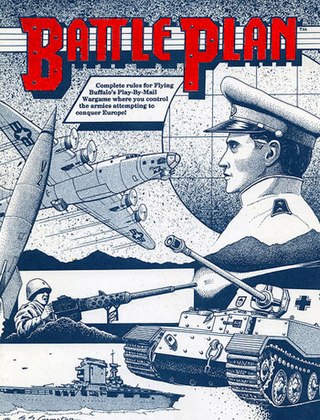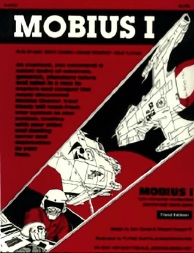Related Research Articles

A play-by-mail game is a game played through postal mail, email, or other digital media. Correspondence chess and Go were among the first PBM games. Diplomacy has been played by mail since 1963, introducing a multi-player aspect to PBM games. Flying Buffalo Inc. pioneered the first commercially available PBM game in 1970. A small number of PBM companies followed in the 1970s, with an explosion of hundreds of startup PBM companies in the 1980s at the peak of PBM gaming popularity, many of them small hobby companies—more than 90 percent of which eventually folded. A number of independent PBM magazines also started in the 1980s, including The Nuts & Bolts of PBM, Gaming Universal, Paper Mayhem and Flagship. These magazines eventually went out of print, replaced in the 21st century by the online PBM journal Suspense and Decision.

Legends is a turn-based, role-playing game with a medieval setting. It is currently published in English by Harlequin Games. Jim Landes—owner of Midnight Games, the game's first publisher—began developing the game in 1984, eventually publishing it in December 1989 as a play-by-mail (PBM) game after over a year of playtesting. The initial game comprised a module and game system built on the publisher's existing game, Epic, and was run briefly as Swords of Pelarn before publication as Legends. The first of multiple game modules was Crown of Avalon, which allowed up to 200 players per game. Demand by 1991 was "incredible" according to Bruce R. Daniel in White Wolf. Games could be lengthy, initially between three and ten years of play, settling into an average of three years by 2002.

Hyborian War is a play-by-mail game published by Reality Simulations, Inc. It takes place during the Hyborian Age in the world of Conan the Barbarian created by Robert E. Howard. The game has been continuously available for worldwide play since its inception in 1985 and has changed little in its overall format. It uses a computer program to adjudicate player orders. Although it relies on postal mail or email and has turnaround times which are relatively long for the digital age of video games, Hyborian War has remained active into the 21st century.
World conquest was a play by mail wargame published for play in 1988 by Prime Time Simulations. It was an "operational level game of land, sea and air warfare".
Monster Island is a play-by-mail (PBM) role-playing game. It was initially published by Adventures By Mail in Cohoes, New York. Jack Everitt, the game designer, came up with the idea for the game in 1985. The game, which was open-ended and computer moderated, was active by 1989, expanded rapidly in North America, and within a few years had spread to Great Britain and Germany. By 1997 it was one of the longest-running PBM games. The game is currently moderated by the UK-based KJC Games.
Fall of Rome is a play-by-mail strategy wargame that was published by Enlightened Age Entertainment. Set in the period after Roman times, it involved covert action and combat. The game won the Origins Award for Best Play-By-Mail Game of 2004.
Lords of the Earth (LOTE) is a play-by-email game, first published by Thomas Harlan in 1983 during a growing era of PBM games. Initially played by postal mail, the game featured mixed moderation—computer moderated with some human assistance. By 2002, the publisher processed turns by email (PBeM). Lords of the Earth comprises multiple campaigns, each one a separate game. Campaign 1 is the oldest, set in the mid-1800s in the "Age of Air and Steam". Other campaigns begin from 2000 BCE to 1400 CE. Settings were global in scale, with one campaign featuring an outer space setting.

Battle Plan is a closed-end, military strategy, play-by-mail (PBM) wargame. It was first published by Flying Buffalo Inc. in 1972, as one of the company's game offerings after Nuclear Destruction, the game that started the PBM industry in 1970. In August 2021, Rick Loomis PBM Games began publishing the game.
TribeNet is an open-ended, medieval fantasy, play-by-email (PBEM) game. It was first published in the mid-1980s in Australia as a hand-moderated play-by-mail (PBM) game. After multiple gamemaster changes in the 1990s, Peter Rzechorzek took over as gamemaster in 1997, at which point the game transitioned from postal mail to email. Since its inception, the game expanded from the initial continent available for gameplay, adding additional continents such as Cyberia and Pelagoria.
Krahlizek is a closed-ended, computer moderated, play-by-mail (PBM) wargame.
Terra II is a open-ended, play-by-mail (PBM) wargame published by Clemens & Associates.
Epic is a computer-moderated, fantasy play-by-mail (PBM) game.

Mobius I is a closed-end, space-based play-by-mail (PBM) wargame of space conquest. The game was first published in 1984 by Mobius Games and was subsequently published by Flying Buffalo, Inc. and Rick Loomis PBM Games.
Warlord is a closed-ended, computer moderated, play-by-mail (PBM) wargame.
Kings of Karadon is a closed-end, mixed-moderated, play-by-mail fantasy wargame. It was originally published by Hunky Monkey Games.
State of War is a closed-end, computer-moderated, play-by-mail (PBM) wargame. It was published by Game Systems, Inc.
Empires for Rent is a closed-end, play-by-mail strategic wargame based in space. It was published by Blue Panther Enterprises.
Spiral Arm is a closed-end, computer-moderated, space-based play-by-mail (PBM) game. Designed in 1983 and launched afterward by Kevin Flynn of Australian Wizard, the game was also offered for play by Graaf Simulations in the United States and Canada and Spellbinder Games in the United Kingdom. 50 positions, one run by computer, began in a spiral-shaped galaxy with up to 49 players per game vying for control of more than half of the galaxy's industrial wealth. Combat, economics, diplomacy, and technological advancement were elements of gameplay. The game received generally positive reviews in Flagship in the 1980s. Over time, publishers began running an improved Version II which outscored Version I in the 1989 Flagship Ratings.
Realms of Fantasy is a closed-ended, play-by-mail (PBM) fantasy wargame. Designed in 1987 by Computer Campaigns of New Zealand, it was eventually published by Australian Wizard, Graaf Simulations in the United States, and Pagoda Games in the United Kingdom. 10 to 50 players per game roleplayed wizards vying for supremacy on a hex map that varied in size depending on the number of players. The game featured magic and combat, with diplomacy not a major factor. It received generally positive reviews in various gaming magazines in the early 1990s with reviewers highlighting its value and simplicity.
References
- 1 2 3 4 Guerrero 1992. pp. 32–33.
- 1 2 3 4 Cameron 1992. p. 43.